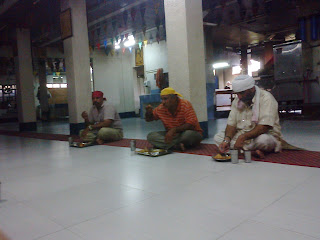"Notes from the Langar Kitchen"
It was last monday when this person visited the Sikh Temple at Isaac Peral St.* in Manila. Originally planned to go to the National Museum, the area's been closed during mondays, that somehow made he look for another place of cultural interest.
Walking from Taft to Isaac Peral, as well as driven by curiousity and a renewed interest in Indian culture, this person find it interesting to visit the actual place (besides the Hindu Mandir in Mahatma Gandhi St.), and somehow quite devoted to the needs of the Indian community in the Philippines, known for their turbans in their heads as well as the moneylending business Filipinos usually make Indians known for.
But in entering the premises has to follow rules: wearing of a head covering, washing of the hands and feet, and silent mode when it comes to cellular phones being carried. The temple's main hall is somehow is as same as any other Sikh temples being featured in the internet such as pictures and a guru reading the Guru Ganth Sahib, but with the modern amenities such as air conditioning and a sliding door both for entrance and exit to the sacred premises.
Yet, in order to get to know about the religion and its culture, this person entered the temple's library. There are Sikh intellectuals whom are cleaning and organising books inside the area, and one of them told yours truly that there are few books about Sikhism written in English, while the rest are written in Punjabi, and one of the most interesting tracts being featured and read is about the life of Guru Govind Singh, the War against Emperor Aurangzeb of the Munghal empire, as well as "Sikhism and Politics" which tackles about Khalistan (the Sikh Homeland) and India.
Entering the dining hall
However, one of the most interesting areas within the temple (besides the temple hall and the library) is the Kitchen and Dining hall known as the Langar.
Spacious, and supported by volunteer Sikhs both in Cooking and in Cleaning the premises, the Langar is known for the free food being served to its devotees, as well as to the non believers as part of its service. As according to history, Langar or free kitchen was started by the first Sikh Guru, Guru Nanak Dev Ji. It is designed to uphold the principle of equality between all people of the world regardless of religion, caste, colour, creed, age, gender or social status, as well as expresses the ethics of sharing, community, inclusiveness and oneness of humanity.
To a Christian perspective, this means the virtue of Charity and brotherly love that is being seriously practised, to the Muslims, the place reminds of the Imaret, the free soup kitchen that also became a state policy (due to the Zakat or Charity Tax) during the Ottoman Empire, also known to be a Caliphate ruled in the same era as Guru Nanak in India.
Quite delicious the food being served from its Kitchen, that most of the meals being served lately were bread based not just sweets; but despite seeing the interesting ones, he chose to eat a meal that consists of Dal (a spiced Indian Lentil Stew) and Chapaties (Flatbread), plus a glass of hot cocoa enough to fill a stomach before journey home. Some Indians find it common for a Non-Indian to visit the premises, be it for the rites, the library, or perhaps for the free food that is served in the temple's dining hall (that somehow made some of Manila's poor satisfied according to one security guard talking about the said area).
Conclusion
Call it uninteresting for a typical person to enter a religious place besides those of the Church, visiting the Chinese Temple would have been driven by picture-taking tourism rather than spiritual and cultural interest, but to enter an Indian temple? Maybe most would call it strange.
But regardless of what they think as "strange", his visit is quite informative not just interesting both because of the books being featured in its library, the sacredness of its place that involves washing of hands and feet, and last but not the least, the free food being served to everyone regardless of colour, sector, religion, status. This person may not be a Sikh, but having a Langar is more than just a Sikh tradition, for in its very known essence, it is a practise on a virtue today's world trying to take it serious. Knowing that "the Light of God is in all hearts", as what the Sahib says.
*currently known as U.N. Avenue






